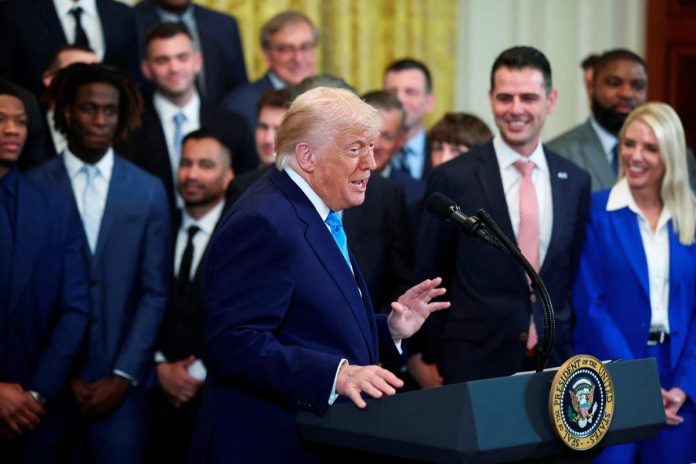NEW YORK: Twelve US states asked a federal court on Wednesday to halt President Donald Trump’s “Liberation Day” tariffs, arguing that he overstepped his authority by declaring a national emergency to impose across-the-board taxes on imports from nations that sell more to the US than they buy.
A three-judge panel of the Manhattan-based Court of International Trade is hearing arguments in a lawsuit brought by the Democratic attorneys general of New York, Illinois, Oregon, and nine other states. They say the Republican president has sought a “blank check” to regulate trade “at his whim.”
The states claim the president badly misinterpreted a law called the International Emergency Economic Powers Act to justify the tariffs. That law is meant to address “unusual and extraordinary” threats to the US, they have said.
Brian Marshall, an attorney for the state of Oregon, told the judges that IEEPA requires presidential actions to be closely tied to a specific emergency. A president cannot use tariffs or other actions “only for leverage” under IEEPA, Marshall said.
Trump has incorrectly claimed that “he can set tariffs of any amount, on any country, for any length of time, and no court can review it,“ Marshall said.
Trump has said the decades-long US history of importing more than it exports is a national emergency that has harmed US manufacturers. But the states argue the US trade deficit is not an “emergency” and that IEEPA does not authorize tariffs at all.
The same three-judge panel heard arguments last week in a similar case brought by five small businesses, and it is expected to issue a decision in the coming weeks.
The Justice Department, which will make its arguments later in the hearing, has said the states’ lawsuit should be dismissed because the states have only alleged “speculative economic losses” instead of concrete harms from the tariffs. It has also argued that only Congress, not US states or the courts, can challenge a national emergency declared by the president under IEEPA.
After imposing tariffs on China, Mexico and Canada in February, Trump imposed a 10% across-the-board tariff on all imports in April, with higher rates for countries with which the US has the largest trade deficits, particularly China.
Many of those country-specific tariffs were paused a week later, and the Trump administration temporarily reduced the steepest tariffs on China this month while working on a longer-term trade deal.
Trump’s on-again, off-again tariffs have shocked US markets. He has framed them as a way to restore US manufacturing capability.
The states’ lawsuit is one of at least seven court challenges to Trump’s tariff policies. California has filed a separate challenge in federal court in San Francisco, and other lawsuits have been filed by businesses, legal advocacy groups and members of the Blackfeet Nation.
Decisions from the court, which hears disputes involving international trade and customs laws, can be appealed to the US Court of Appeals for the Federal Circuit in Washington, D.C., and ultimately the US Supreme Court.








